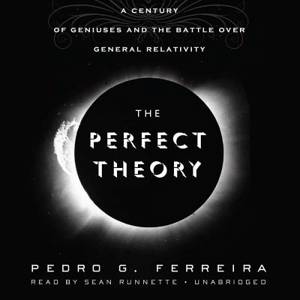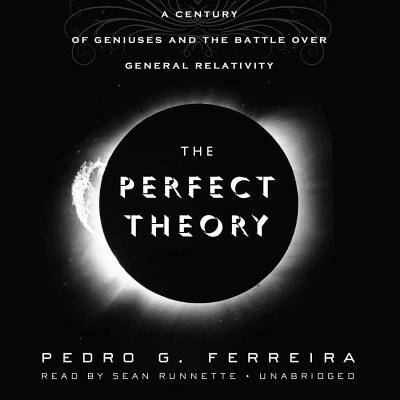
- Retrait gratuit dans votre magasin Club
- 7.000.000 titres dans notre catalogue
- Payer en toute sécurité
- Toujours un magasin près de chez vous
- Retrait gratuit dans votre magasin Club
- 7.000.0000 titres dans notre catalogue
- Payer en toute sécurité
- Toujours un magasin près de chez vous
The Perfect Theory Livre audio
A Century of Geniuses and the Battle Over General Relativity
Pedro G Ferreira
CD | Anglais
43,45 €
+ 86 points
Format
Description
How did one elegant theory incite a scientific revolution?Physicists have been exploring, debating, and questioning the general theory of relativity ever since Albert Einstein first presented it in 1915. Their work has uncovered a number of the universe's more surprising secrets, and many believe further wonders remain hidden within the theory's tangle of equations, waiting to be exposed. In this sweeping narrative of science and culture, astrophysicist Pedro Ferreira brings general relativity to life through the story of the brilliant physicists, mathematicians, and astronomers who have taken up its challenge. For these scientists, the theory has been both a treasure trove and an enigma, fueling a century of intellectual struggle and triumph.Einstein's theory, which explains the relationships among gravity, space, and time, is possibly the most perfect intellectual achievement of modern physics, yet studying it has always been a controversial endeavor. Relativists were the target of persecution in Hitler's Germany, hounded in Stalin's Russia, and disdained in 1950s America. Even today, doctorate students are warned that specializing in general relativity will make them unemployable.Despite these pitfalls, general relativity has flourished, delivering key insights into our understanding of the origin of time and the evolution of all the stars and galaxies in the cosmos. Its adherents have revealed what lies at the farthest reaches of the universe, shed light on the smallest scales of existence, and explained how the fabric of reality emerges. Dark matter, dark energy, black holes, and string theory are all progeny of Einstein's theory.We are in the midst of a momentous transformation in modern physics. As scientists look farther and more clearly into space than ever before, The Perfect Theory reveals the greater relevance of general relativity, showing us where it started, where it has led, and where it can still take us.
Spécifications
Parties prenantes
- Auteur(s) :
- Editeur:
Contenu
- Langue:
- Anglais
Caractéristiques
- EAN:
- 9781483006178
- Date de parution :
- 01-04-14
- Format:
- CD
- Format numérique:
- MP3-formaat
- Dimensions :
- 135 mm x 170 mm
- Poids :
- 68 g

Les avis
Nous publions uniquement les avis qui respectent les conditions requises. Consultez nos conditions pour les avis.






